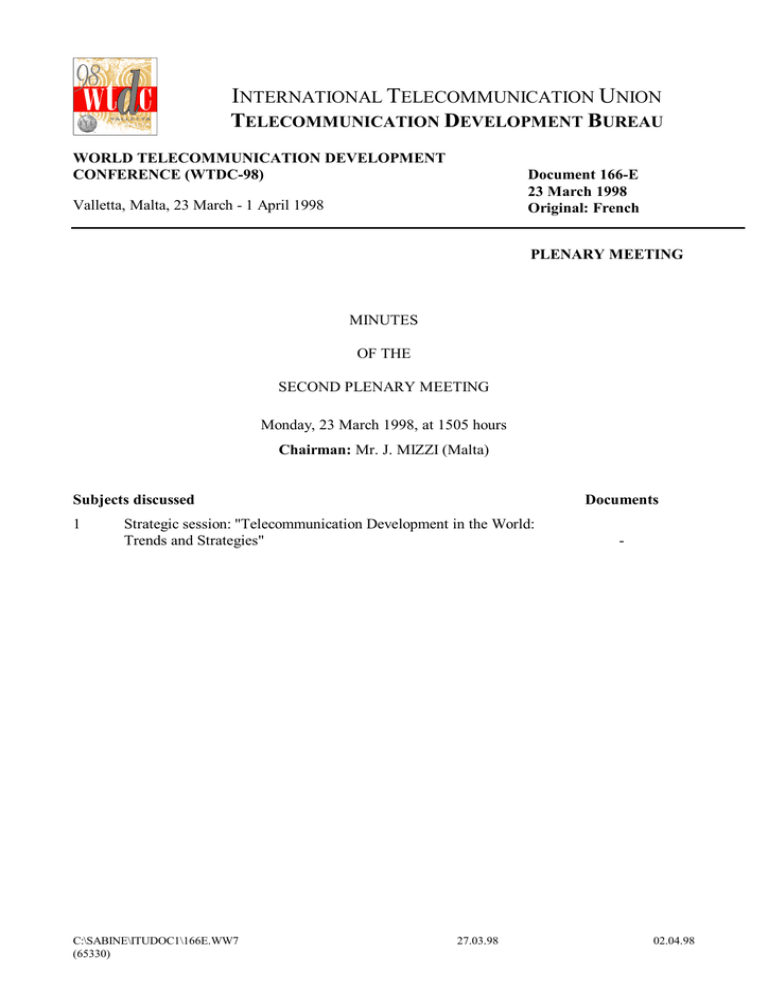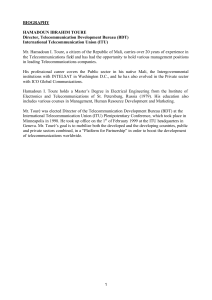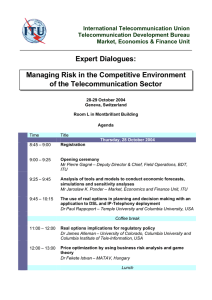I T U D
advertisement

I NTERNATIONAL TELECOMMUNICATION UNION TELECOMMUNICATION DEVELOPMENT BUREAU WORLD TELECOMMUNICATION DEVELOPMENT CONFERENCE (WTDC-98) Document 166-E 23 March 1998 Original: French Valletta, Malta, 23 March - 1 April 1998 PLENARY MEETING MINUTES OF THE SECOND PLENARY MEETING Monday, 23 March 1998, at 1505 hours Chairman: Mr. J. MIZZI (Malta) Subjects discussed 1 Documents Strategic session: "Telecommunication Development in the World: Trends and Strategies" C:\SABINE\ITUDOC1\166E.WW7 (65330) 27.03.98 - 02.04.98 -2CMDT98/166-E 1 Strategic session: "Telecommunication Development in the World: Trends and Strategies" 1.1 The Chairman invited the participants to make their general policy statements*. 1.2 The Minister of Culture and Communication of Benin drew attention to the importance of the problem of financing, which was essential to the development of the telecommunication sector in the developing countries, especially in Africa. The gulf between the industrialized and the developing countries was still huge, and if nothing was done to bridge it, there was a risk that it would further widen. Despite the efforts made by the African countries, the results so far obtained were far from meeting the continent's needs for communication services. Accordingly, heavy investment had to be made in order to develop that sector in the interests of economic development as a whole. In Benin, machinery had been put in place to mobilize resources in both the private and the public sectors, since the authorities were convinced of the need to liberalize the telecommunication sector and of the importance of blending the different methods of financing that were available. 1.3 The Vice-Minister for Transport, Communications and Civil Aviation of Bolivia, after recalling that his country had progressed from a monopoly situation in telecommunications to an open market, pointed out that the development of telecommunications should not be to the advantage of a privileged section of the community but should reach the entire population. The participants in WTDC-98 should do their utmost to attain that goal. 1.4 The Minister of Posts and Telecommunications of Cameroon, after noting that the concept of a global information infrastructure had become a reality, outlined recent developments in telecommunications, stressing the need to do what the Maitland Commission had previously done in another context, namely to study the impact of the liberalization of the telecommunication sector and the role of regulation, especially in the developing countries. The opening up of the market in those countries gave rise to mixed feelings, since alternative calling procedures were among the factors that had led to a fall in revenue. Lastly, he pointed out that there could be no peaceful coexistence between pockets of poverty and of prosperity. 1.5 The Vice-Minister of Posts and Telecommunications of China highlighted the changes that had taken place in the telecommunication environment since WTDC-94 and noted that, in spite of the efforts made by ITU, the gap between the developing and the developed countries continued to widen, particularly in the area of the global information infrastructure. The Conference should therefore strive to find solutions tailored to the circumstances prevailing in each country, on the understanding that the developing countries should do everything in their power to further the development of their telecommunications by introducing liberalization measures and competition when the time was right. After drawing attention to the lack of capital in the developing countries and the fact that they were lagging behind in terms of technology, he called upon the industrialized countries, equipment manufacturers and international financial institutions to help the developing countries to make their telecommunication sectors more dynamic by offering concessional loans and providing technology transfers and training geared to local needs. In conclusion, he pointed out that his country had given strategic priority to telecommunications in the context of overall economic development and had introduced policies conducive to the development of that sector. ____________________ * The text of these statements will be published at a later stage. C:\SABINE\ITUDOC1\166E.WW7 (65330) 27.03.98 02.04.98 -3CMDT98/166-E 1.6 The Vice-Minister of Communications of Colombia drew attention to the importance of the WTO agreements for his country, which had opened up its telecommunication sector to foreign competition and investment. For local telephone calls, for example, there were now over 37 operators in Columbia. Furthermore, the share of the telecommunication sector in the overall development plan had risen from 2.6% to 7% and telecommunications were expected to raise GDP. 1.7 The Minister of Posts and Telecommunications of Congo said that his country urged ITU to assist the developing countries in a planned process of liberalization in which various stages, ranging from terminals to international telecommunications, were necessary in order to achieve greater coherence. ITU should take care not to lose its intergovernmental character and should contribute to enhanced cooperation between Member States and Sector Members to ensure the harmonious development of telecommunications. Lastly, he made a special appeal to the Development Sector to assist his country in rebuilding and modernizing its telecommunication infrastructure. 1.8 The Minister of Economic Infrastructures of Côte d'Ivoire said that all participants were aware that an efficient telecommunication network was an essential component of the infrastructure needed for the development of a modern economy. In the context of telecommunication reform and new technologies, Africa's share in the world telephone network amounted to only 2%, with hardly any telephone services in rural areas. In addition, Africa was the only continent in which all the equipment in use was entirely produced elsewhere, which explained the exorbitant cost of establishing networks and the high level of tariffs, making communication services unattainable for the general population. In Côte d'Ivoire, which was characterized by sparse telephone coverage, a wide disparity between the capital and the rest of the country, frequent breakdowns owing to inadequate maintenance and the obsolescence of some equipment, together with a strong, unsatisfied expressed demand and a fairly high unexpressed potential demand, the authorities had adopted a telecommunication code and privatized the national operator. To ensure the balanced development of telecommunications throughout the world, the Conference should adopt guidelines and treat the transfer of technology as a permanent feature in the development of telecommunications in the countries of the South. 1.9 The Minister of Communications of Cuba said that his country's economy had undergone a radical transformation and that the authorities had adopted a series of measures, including a revision of the Constitution for example, to enable private-sector participation, the restructuring of State bodies and the promulgation of a law authorizing foreign investment. As a result, two semipublic enterprises had been created, one in the field of cellular telephony, the other in universal telephony. In 1994, the entire telecommunication system had been restructured, separating the operating and regulatory functions. However, since lack of cooperation and funding continued to impede the implementation of development projects, he called upon all countries attending the Conference to support any steps it might recommend on behalf of the developing and least developed countries, respecting the principle national sovereignty and international law. 1.10 The Chairman of the Federal Communications Commission stated that all players in the telecommunication sector were the true architects of the future global information society in that they were establishing the links and means needed to connect people throughout the world. It was therefore vital that all participants in the Conference should endeavour, first, to make the most of private capital, since neither the public authorities nor the multilateral agencies had the resources needed to make the necessary investment in the new technologies and the infrastructure required for universal access; secondly, to promote competition which, apart from privatization, was the driving force in the development of telecommunications and undoubtedly benefited the consumer; and C:\SABINE\ITUDOC1\166E.WW7 (65330) 27.03.98 02.04.98 -4CMDT98/166-E thirdly, to stress the crucial role of the public authorities and the regulatory agencies in ensuring fair competition and the independence of operators. Finally, he called upon all participants to put those principles into practice and to share their experience in order to build a global community in which all members felt that they belonged to the same family. 1.11 The Ambassador of France drew attention to the importance accorded by his country to development issues by virtue of the principles and duties of solidarity it upheld in its bilateral relations and through its active participation in the work of international organizations. Accordingly, France would approach the economic, regulatory, technical and human problems involved in the development of communications in a constructive and balanced way. In that respect, ITU and especially the Development Sector should, in conformity with their mission, play a pilot, coordinating and catalytic role in the field of assistance to the developing countries and help to devise new forms of cooperation, taking into account the growing importance of the part played by the private sector and of technological change. In that context, he expressed support for partnership solutions, notably between the public and private sectors, provided such solutions were balanced and made allowance for the respective interests of the parties concerned. Furthermore, BDT had the task of providing the multilateral assistance needed by many developing countries in the regulatory area of the sector, particularly with regard to universal service and interconnectivity. The WTO agreements and technological pressure were responsible for the gravity of the decisions that the developing countries had to take and for the high stakes involved in deregulation. In that connection, competition was not an end in itself, but a contribution to national development, and regulation was necessary if the process was to be carried out in conformity with political choices and in the pragmatic spirit required for the harmonious development of the market, which had to be geared to the circumstances peculiar to each country. 1.12 The Secretary of State for Works and Communications of Gambia called for less inequality and a better balance between the developed and the developing countries so that the information society might become truly global. In his view, the best way of serving that dual purpose was by providing universal access to telecommunication services. From that point of view, the Conference agenda seemed fully satisfactory and would surely make a contribution to reducing the differences in levels of development. He urged the formulation and adoption of bold and innovative strategies which would allow the least developed countries to make the technological leap forward essential to the advent of the information society of the 21st century. 1.13 The Minister of Communications of Ghana pointed out that for his Government universal access was the first priority for the development of telecommunications. He hoped that the Conference would succeed in reaching agreement on innovative strategies conducive to the development of rural telecommunications. After highlighting the various steps recently taken by his country to adjust to developments in the new telecommunication environment, notably the participation of a strategic investor and the liberalization of value-added services, he invited the participants in the Conference to do their utmost to make telecommunications an instrument for the development of rural areas and the most underprivileged sectors in Africa. 1.14 The Secretary-General of the Department of Tourism, Posts and Telecommunications of Indonesia, after outlining the main features of the new telecommunication environment, raised the issue of the part that ITU should play in future to help supply the famous "missing link". More than ever, it should have a leading role in a number of areas: it should help to shape the global information society for all its Members; it should also channel the veritable technological revolution that would eventually bring that society into existence; and through the work of its Sectors it should C:\SABINE\ITUDOC1\166E.WW7 (65330) 27.03.98 02.04.98 -5CMDT98/166-E provide solutions geared to the changing needs of its Members, especially the developing countries, which it should help to satisfy by expanding the catalytic role it played in the field of coordination in order to harness the vast resources required. His own country, in accordance with the Buenos Aires Action Plan, had inaugurated a vast and ambitious programme to bring Indonesia into the information society by the year 2001, beginning at the regional level and then proceeding to world level. With the firm intention of promoting national unity and the equality of all citizens in respect of access to knowledge and personal fulfilment, his Government had opted for rapid technological progress, market liberalization, competition and the development of human resources so that Indonesia would be well equipped to join the global information society at the earliest possible opportunity. 1.15 The Deputy Minister of Posts and Telecommunications of Japan noted that since the adoption of the Buenos Aires Action Plan the gap in the development of telecommunications had widened in spite of the radical changes that had subsequently intervened. The situation called for the introduction of genuinely innovative solutions aimed inter alia at lowering the general cost of technology. It would be perfectly feasible, for example, to combine digital mobile telephony for the local loop with low-Earth orbit systems to serve ultimately the most remote areas of vast developing regions, at a cost that would not be prohibitive. Such solutions, however, might not be profitable for private companies which preferred to focus their research and development work on value-added services generating high returns. Since it could not come from the marketplace alone, the initiative would have to be taken by ITU, which should set up a world technological development programme designed to create an environment in which the public and private sectors would work together to develop the kind of technology that the developing countries really needed. To that end, ITU should identify the most promising technologies and try to mobilize manufacturers throughout the world to work on specific projects to which it should allocate some of its own resources. 1.16 The Minister of Transport and Communications of Kenya pointed out that regional telecommunication development conferences were very useful and should therefore be organized on a regular basis with ITU support and the active participation of all the partners concerned and the regional telecommunication organizations. It was also essential that the decisions taken by those conferences should be applied, particularly the decisions of the latest African regional conference relating to the revitalization of the PANAFTEL network and the implementation of the African Green Paper. Kenya was requesting assistance from BDT for the development of its human resources, in particular the Kenya College of Communications Technology, and for the rehabilitation of the testing and calibration centre set up in Kenya with the help of ITU and UNDP, so that it could be used to calibrate digital equipment. The BDT should also promote regional cooperation regarding the use of available training facilities, the problems of poor functioning and the planning and implementation of regional research and development projects, with such assistance focusing on technical cooperation, the development of human resources and the maintenance of telecommunication equipment. 1.17 The Assistant Minister of Posts and Telecommunications of Liberia said that after emerging from seven years of crisis, his country had opened up its market to the private sector and foreign investment, and had stopped subsidizing public-sector enterprises, including the national regulatory agency, LTC. The latter had signed partnership agreements with foreign companies, which, with the very rapid extension of GSM systems, should enable Liberia take its place, albeit limited, in the global information society. C:\SABINE\ITUDOC1\166E.WW7 (65330) 27.03.98 02.04.98 -6CMDT98/166-E 1.18 The Minister of Posts and Telecommunications of Madagascar said that ITU should endeavour to help all countries to carry through the liberalization and privatization processes affecting all sectors, including telecommunications. In that respect, Madagascar had opted for a strategy based on a partnership system between the national private sector and international private companies, its purpose being to secure universal access on the best possible terms. 1.19 The Minister of Communication of Mali pointed out that the situation of the African countries was characterized, generally speaking, by the inability of communication infrastructures to meet potential demand and needs, particularly with regard to basic telecommunications and value-added services, including the Internet. Faced with such enormous and manifold requirements, as well as the many challenges of globalization, deregulation and the advent of the global information society, African telecommunication enterprises had to undertake bold institutional reforms. After reviewing the technical and financial aspects of the reforms introduced by Mali for that purpose, she stated that the African countries expected BDT to carry out the work decided upon at the African Regional Telecommunication Development Conference, and in particular that it should implement the African Green Paper, revitalize the PANAFTEL network and assist in the reform of the telecommunication sector. She urged BDT and development partners to promote efforts on behalf of investment financing strategies and policies and hoped that the Final Acts of the current Conference would help to speed up the overall reform process. The meeting rose at 1730 hours. The Secretary: H. PIETERSE C:\SABINE\ITUDOC1\166E.WW7 (65330) The Chairman: J. MIZZI 27.03.98 02.04.98


